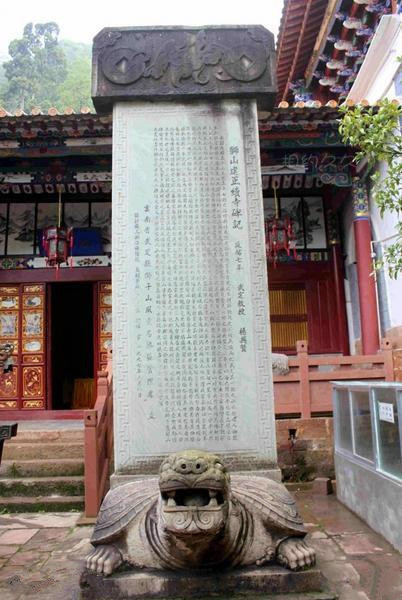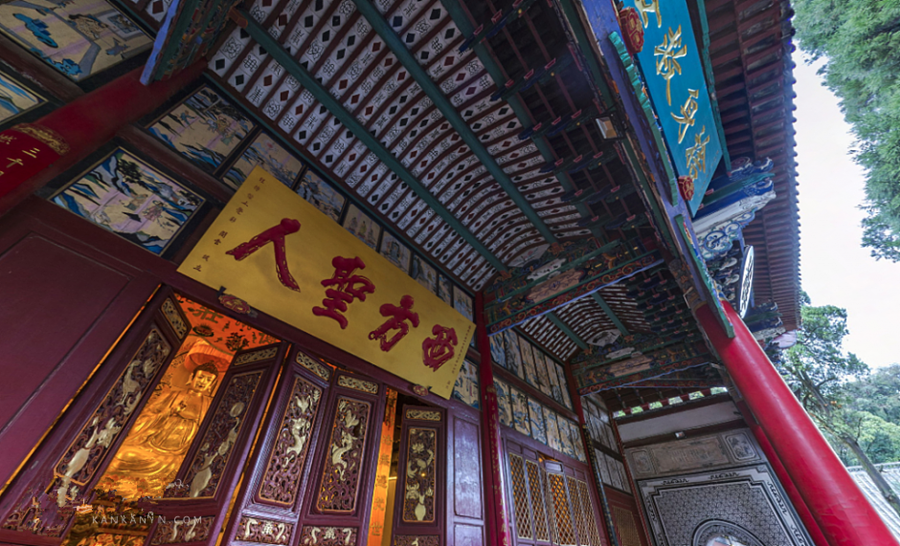
Zhengxu Temple in Wuding County, Chuxiong
Chinese Name:武定狮子山正续寺
English Name: Zhengxu Temple in Wuding County, Chuxiong
Zhengxu Temple, located on Lion Mountain (Shizi Mountain) in the southwest of Wuding County, Yunnan Province, was founded in 1311 during the Yuan Dynasty. It underwent several reconstructions and expansions during the Ming and Qing Dynasties, resulting in a vast and majestic temple complex. The site contains over a hundred buildings, including the Mahavira Hall, Guanyin Hall, and the Sutra Library.
Historical Legend of Emperor Hui
According to legend, Emperor Hui of the Ming Dynasty, Zhu Yunwen, took refuge and became a monk at Zhengxu Temple in 1403 after being overthrown by his uncle, Zhu Di. A statue of Emperor Hui, dressed in monk’s robes, can be found in the Sutra Library, alongside statues of two eunuchs and an old minister. A couplet in the temple reads:
“The monk became an emperor, and the emperor became a monk. For decades, the robe and bowl were passed on, the awakening remains as regal as before.
The uncle betrayed his nephew, but the nephew did not betray the uncle. After walking 8,000 miles in straw sandals, Lion Mountain stands taller than Yan Mountain.”
Emperor Hui’s Journey and Disguise as a Monk
After Zhu Di’s forces captured Nanjing, historical records suggest that Emperor Hui planned to commit suicide. However, a eunuch named Wang Yue remembered a chest left by Emperor Taizu (Zhu Yuanzhang), containing monastic certificates, robes, and a map of secret passages. Emperor Hui and his companions disguised themselves as monks and fled through the palace’s hidden tunnels.
Their journey took them through Hunan, Hubei, and Sichuan before arriving in Yunnan. Initially residing in Wuhua Temple in Kunming, Emperor Hui secretly met with Mu Sheng, the local military governor and a trusted ally of his grandfather, Zhu Yuanzhang. Mu Sheng helped Emperor Hui hide in Lion Mountain near Wuding, where he lived as a wandering monk to avoid capture.
Emperor Hui’s Life at Zhengxu Temple
In his later years, Emperor Hui returned to Zhengxu Temple, where he lived as a monk. The Mahavira Hall at the temple bears a couplet reflecting Emperor Hui’s dual identity as both monk and emperor, symbolizing his unique journey. Additionally, two peacock pines and a luohan pine in front of the hall are believed to have been planted by Emperor Hui himself, adding to the temple’s historical significance.



 7 Days GolfingTour
7 Days GolfingTour
 8 Days Group Tour
8 Days Group Tour
 8 Days Yunnan Tour
8 Days Yunnan Tour
 7 Days Shangri La Hiking
7 Days Shangri La Hiking
 11 Days Yunnan Tour
11 Days Yunnan Tour
 6 Days Yuanyang Terraces
6 Days Yuanyang Terraces
 11 Days Yunnan Tour
11 Days Yunnan Tour
 8 Days South Yunnan
8 Days South Yunnan
 7 Days Tea Tour
7 Days Tea Tour
 8 Days Muslim Tour
8 Days Muslim Tour
 12 Days Self-Driving
12 Days Self-Driving
 4 Days Haba Climbing
4 Days Haba Climbing
 Tiger Leaping Gorge
Tiger Leaping Gorge
 Stone Forest
Stone Forest
 Yunnan-Tibet
Yunnan-Tibet
 Hani Rice Terraces
Hani Rice Terraces
 Kunming
Kunming
 Lijiang
Lijiang
 Shangri-la
Shangri-la
 Dali
Dali
 XishuangBanna
XishuangBanna
 Honghe
Honghe
 Kunming
Kunming
 Lijiang
Lijiang
 Shangri-la
Shangri-la
 Yuanyang Rice Terraces
Yuanyang Rice Terraces
 Nujiang
Nujiang
 XishuangBanna
XishuangBanna
 Spring City Golf
Spring City Golf
 Snow Mountain Golf
Snow Mountain Golf
 Stone Mountain Golf
Stone Mountain Golf















